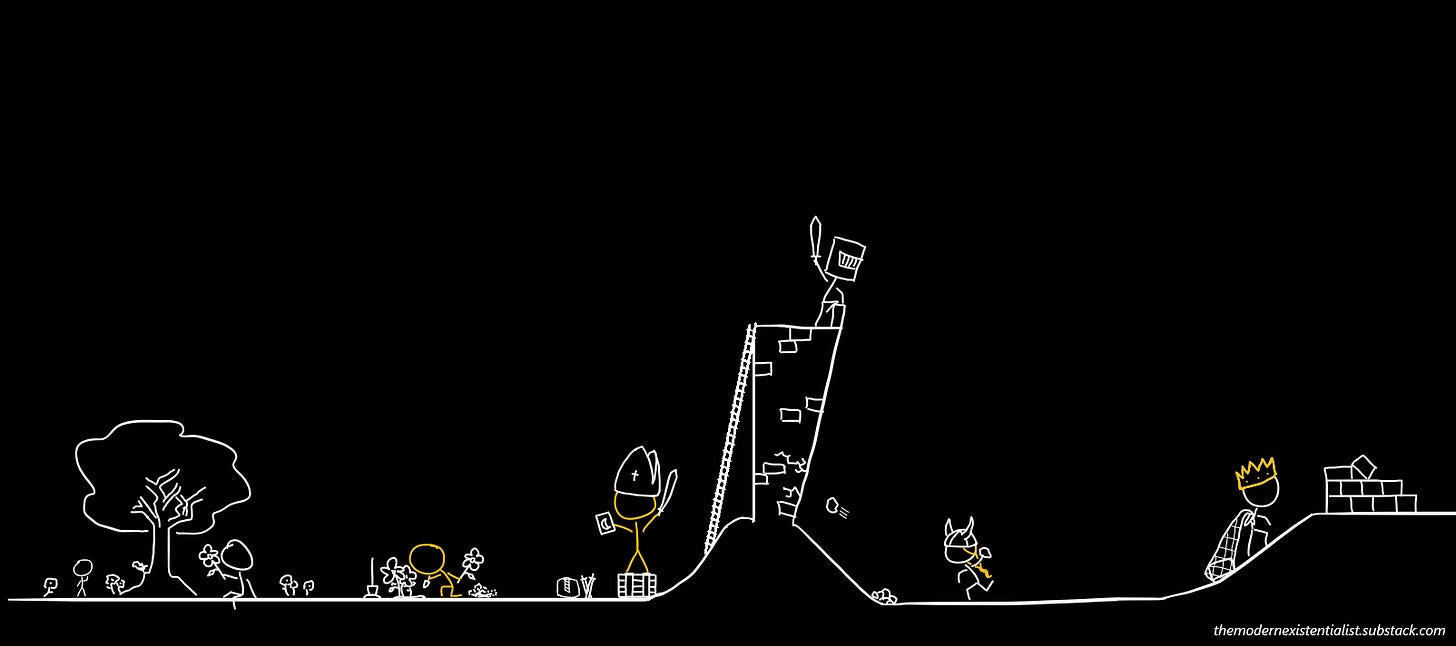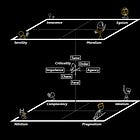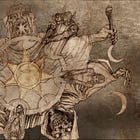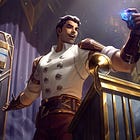7 | MORALISM : the Charlatan
Method & Madness | Book II : Archetypical Philosophies
The priestly mode of morality is born of ressentiment, and thus is deeply reactive—focused on demonizing and condemning the powerful rather than affirming any values of its own. It was the priests, who—in redefining “good” to mean “meek, poor, and suffering”—initiated the slave revolt in morality. Their deep hatred for the values of the masters led them to reframe weakness as the cardinal virtue.
—F. Nietzsche (ab. M. Hise)
All masters are made by the will of their people—all leaders called forth because their tribe believes. Raised to Power through aggregate choice by his followers, laborers, or brothers-in-arms, a king is crowned always by majority vote—a majority, however, not necessarily of people… but instead, only ever of Agency.1
The Moralist watches and waits in silence, coveting the Pragmatist’s throne: his ability to command the respect and Agency of men loyal to the master’s crown. He desires to control this Eden—his home—so that he, too, can hold the Power to protect the things which he loves and has chosen for himself. The Moralist, however, is the one who knows his own weakness best: that—in order to strike the master down and seize the crown from atop his head—he must first refine his own Power to move and inspire the garden’s men.
Thus, the Moralist is the Charlatan—he who believes that he must resort to cunning tactics to find success. In the name of necessity—in order to protect the things he loves—he commits himself to deplorable acts (to lies, murder, fraud, and theft): any method which would allow him to bend the master’s Order to his own advantage. To seize that crown—to wrest control of his own fate from the hands of a more Powerful man—the Charlatan conspires in the shadows to convince his peers, betters, and lesser men… that he is, in truth, the most Powerful and capable—
That he deserves to be king instead.
The Moralist is the playwright of social contagion—the father of all the greatest stories authored by man. He is the maker of Ethics—of all religion and ideology—waging a devious political war using moral systems as his weapon. By means of deception and obfuscation, he casts himself as PRIMOGENITOR, claiming for himself the unique Power to define Truth and Justice: the exclusive authority to claim knowledge of the truth of Good and Evil.2
Thus is the Moralist the one who believes that there are two kinds of people in this world:
The shrewd, and the naïve.
There are those who believe in the Good and the right: in a kind world of inherent Order, in which all things are made to happen by design. Then, there are those who believe in Chaos: who understand that Man stands alone—that the world is indifferent to the struggles of our kind. Thus, through his Power to move and deceive does this Charlatan bend the naïve to his will, stealing their Agency through his grand lie—inciting them to tear their master down, sending him tumbling to his doom.
The Servile seeks the Pragmatist’s wealth; the Moralist covets his Power. In the name of everything that he loves, he desires to steal the master’s promise; to claim the ability to command the willing Agency of a host of men, and commit them to his vision of home instead. But, through the cunning war he wages, he unwittingly alters the rules of engagement. No longer is it a game of Order—of Pragmatists who work to bound Chaos and make life stable and safe—but instead, now a game of Chaos; of punching holes in the fortress-wall to disrupt Order and distract other men, allowing a Charlatan to seize the throne: to become the Moralist-king instead.
Thus the Moralist incites the meek, arming Eden’s bravest, densest sons—commanding them to rise to his cause to hunt and slay Evil. But by his decree—and his alone—is Evil now to be defined… and thus, does he now define new Evil: hidden demons which invade their home, masquerading as the Righteous and the meek. Devious beasts who hold greed in their hearts and worship the icon of Evil—the wicked tyrant whose wall has clearly failed to protect the people of Eden. And so, does the Moralist unwittingly invite the garden’s creeping division and decay—and, given time and enough men playing the cunning Charlatan’s game—its final ruination and return to a world feral, lawless, and free.
Philosophy: a mindset. a worldview. The way that one chooses to see the world, and thus approach living one’s life.
Αρχή | archí: origin
Τύπος | týpos: form
An Archetypical Philosophy is the logical basis of a person’s attitude, derived from observation of how he-or-she chooses to exist.
Every individual is their own person, possessing talents, skills, and expertise in varying type and quantity. Every person, therefore, commands a different degree of Agency. It’s true that there’s a sense in which everyone’s the same—that is, that everyone simply has Agency. However, it’s obviously also equally true that every individual’s Agency is unique—and, therefore, that any two given people will possess more or less relative Agency.
As in Nietzsche. Also: biblical.

















